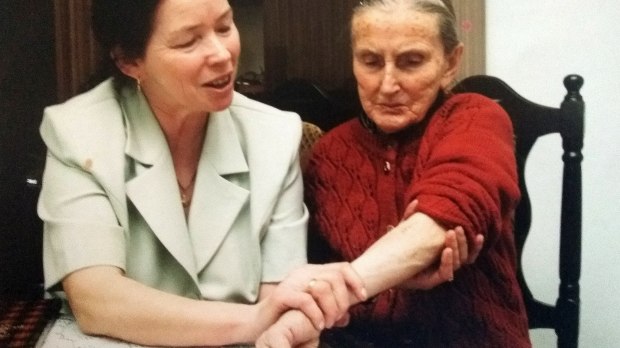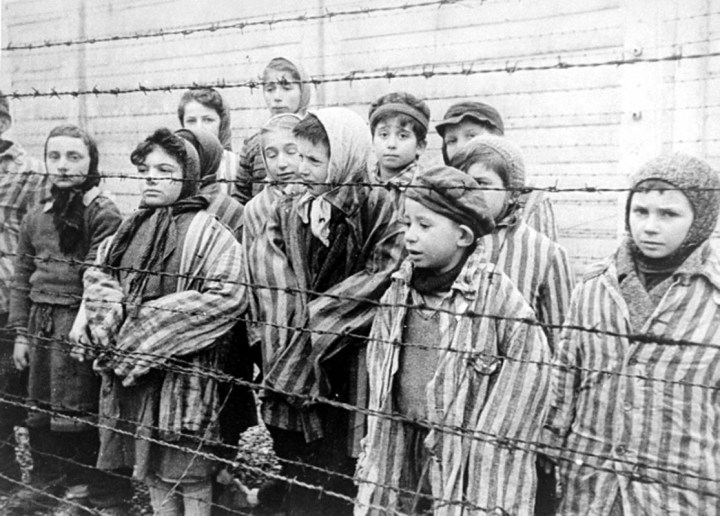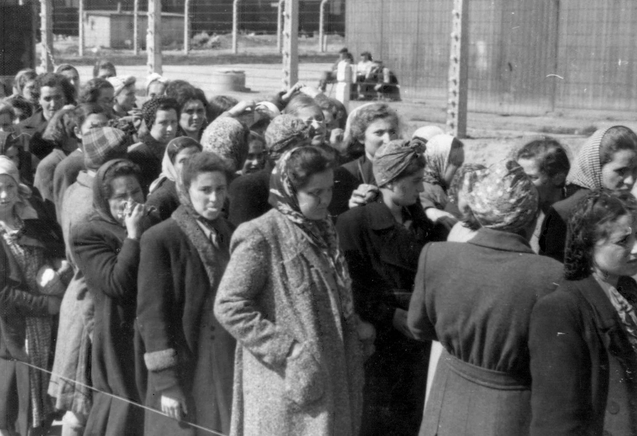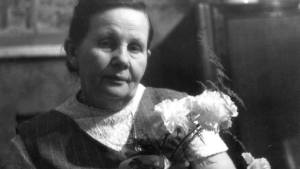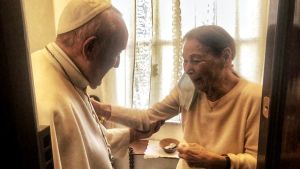Editor’s note: The following story may be especially upsetting to those who have experienced infant loss or trauma.
“Right after I was born, they tattooed the number 89136 on my left leg, but today it’s no longer visible, only a purple mark remains. Mom cried a lot when they brought me to her with that number. I was my parents’ firstborn, for whom they had hoped very much,” says Stefania Wernik.
Stefania is now 77 years old, and lives in Osiek, near Olkusz, Poland. She’s been married to her husband Jan for 58 years and is a mother, grandmother, and great-grandmother. She’s cheerful and smiling, and her eyes sparkle when she speaks. Her adult life has been a happy one, but on her birth certificate the name of where she was born still gives her the shivers: Auschwitz-Birkenau.
We know from available documents that in the camp of Auschwitz a midwife named Stanisława Leszczyńska attended more than 3,000 births. Among them was that of Stefania Piekarz.
During the war, there were shortages of everything, and Stefania’s mother left her town to visit her parents, who lived in Osiek. It was April, it was hot, she had to travel about six miles, but the Germans caught her during a roundup of women smugglers and arrested her with them. The captured women were taken to Olkusz, and from there, after a day in prison, to Auschwitz. Anna didn’t mention that she was two months pregnant. Stefania recalls her mother’s stories:
When they arrived there, a German woman was waiting for them on the ramp: ‘Do you know where you’ve arrived? This is an extermination camp! From here you can only get out through the chimney!’ Then they took them to the bathrooms, shaved them and forced them to wear striped uniforms. The water was foul-smelling, the clothes were stiff from dirt, and the wooden clogs hurt their bare feet and weighed them down.
In the camp documents they wrote: Piekarz Anna, number 79414, born July 13, 1918. She arrived at Auschwitz on May 14, 1944, at age 26, and was assigned to barrack number 11.
Auschwitz and the experiments of the “angel of death”
Stefania says that thankfully she doesn’t remember anything, and that her mother never wanted to talk too much about the camp. “We were there twice together, but she didn’t say much. Only just before she died, when she lost touch with reality, she cried out in her sleep, saying that she was on her knees in the water, that they were walking, that her legs hurt a lot, that it was cold, and that he will take away Stefania away from her,” says Stefania, who as an infant and child was subjected to medical experiments.
Her mother recalled that as soon as Stefania was born, Mengele would forcefully remove her from his arms, and when they brought her back she would cry for hours and no one could calm her down.
Infants in Auschwitz: Born to die
Stanisława Leszczyńska, the camp midwife, recorded in the Auschwitz Midwife Report the atrocities that were committed:
Until May 1943, babies born in the camp were cruelly murdered, drowned in a barrel. After each birth, a loud gurgling sound and that of a long, sometimes persistent jet of water reached the ears of the midwives. Soon after, the mother could see the body of her child thrown in front of the block and torn by rats.
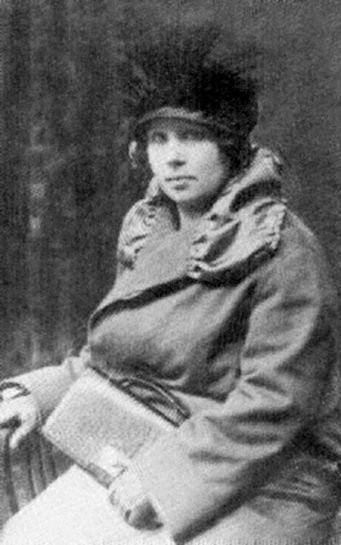
There were no diapers, bandages, analgesics or disinfectants. There wasn’t even any water. According to Stanisława Leszczyńska, Stanisława collected the wet remains of bitter herbs from the cups the prisoners had not drunk, washed the infants with those remains, and cut the umbilical cord with rusty scissors.
By August, Anna Piekarz was on the truck that was supposed to take her to the Ravensbrück camp. Her friend Hela told the “kapo” that Anna was pregnant. They took her off the truck and transferred her to barrack 15; she was also taken off the heavy labor list.
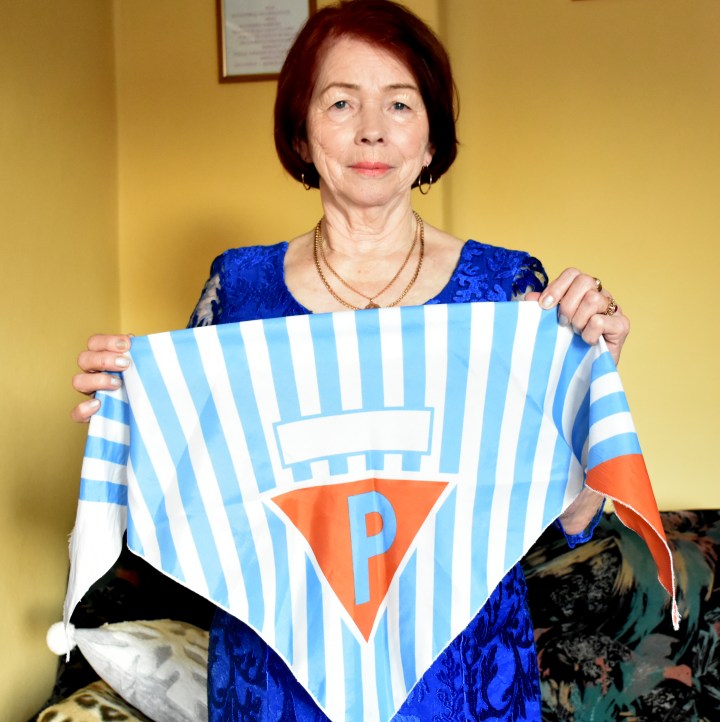
The birth
Baby Stefania’s birth lasted three days, from Monday to Wednesday. Her mother Anna was so weak that she barely had the strength to give birth. Undernourished, hungry, and cold, she gave birth to the baby girl in the camp hospital.
She didn’t remember having anyone by her side, although according to Stanisława Leszczyńska’s report, someone was always there to help at childbirth. After giving birth, she was sick for two weeks, yet still produced a lot of milk, although it’s unclear how since she weighed just 62 lbs. The women in the barracks made baby clothes for little Stefania from the canvas of the striped uniforms, along with a blanket and a small pillow. Winter was approaching, however, and those tattered clothes full of lice couldn’t warm the child’s cold body, washed with freezing water.
She and her mother miraculously survived to see January 27, 1945, the day the camp was liberated. The Germans were destroying documents and setting fires, but the doors were open, and Anna Piekarz decided to escape. She wrapped her child in a blanket or coat (she could never remember which), then she turned over a stool, put Stefania in it, tied a rope to the legs of the stool, and dragged the makeshift container with her baby across the snow. She didn’t have the strength to pick up her daughter; she was too weak.
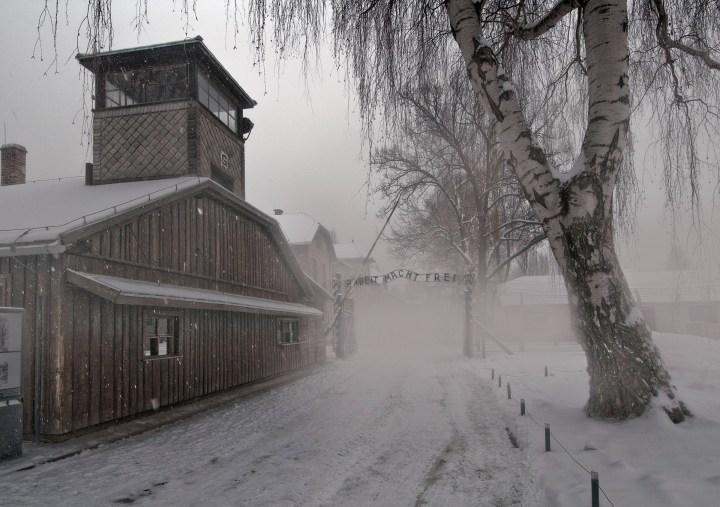
“When the liberation of the camp came, my mother took me away, hidden in a stool that she dragged through the snow to Libiąż. There we were welcomed by good people. Then someone told my dad, but he didn’t believe it! Finally he came and took us home. People came from all over the area, as if a miracle had happened,” Stefania recalls.
“After a while, my father went to the registry office to inform about my birth, but as a birthplace he put Czubrowice,” says Stefania. Why? “He was afraid the Germans would take me away. It wasn’t until 1977 that I corrected my birth certificate before the court in Krakow.”
She goes on to say:
Although the name Auschwitz in the documents simply evokes sadness, it resembles Mama’s suffering. The body doesn’t want to forget this nightmare. The diseases of the women in my family are hereditary. The skin on my head was wrinkled like a cabbage until I was 16, and the fear I suckled with the milk from my terrified mother accompanies me to this day.
